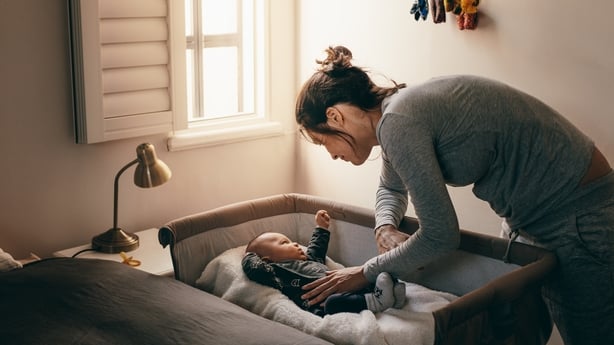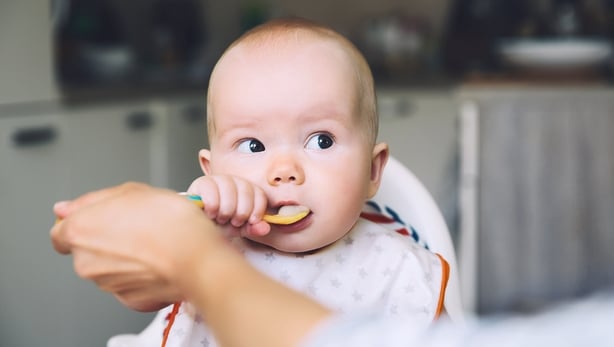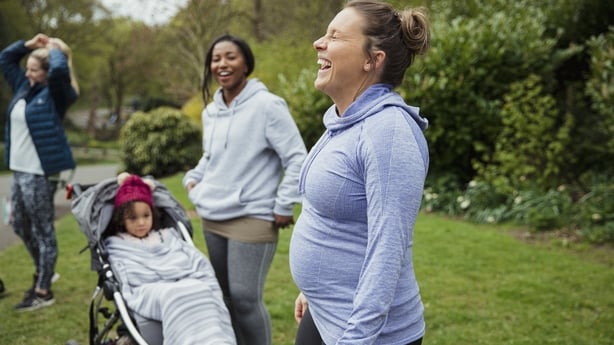How did the pandemic impact babies who were born during those lockdown years? Dr Susan Byrne from the RCSI Department of Paediatrics joined Drivetime to discuss new research that points to communication gaps in pandemic babies. Listen back above.
New research suggests that babies born during the pandemic have gaps in how their communication skills developed, seemingly confirming a worry held by parents and researchers looking at child development.
RSCI University of Medicine and Life Sciences set up the study to look at babies born during pandemic years when lockdowns forced us inside and away from traditional social gatherings, "really just to look at what the world was going to be like for those babies", Bryne said.

The study recruited almost 400 babies born between March and May 2020, "and the aim was to follow them up at intervals so they came from interviews at six months, 12 months and 24 months".
When the babies were one year old the team asked their parents 10 questions about whether the child was able to reach certain developmental milestones. At two years old, the team asked more detailed questionnaires, looking at communication, motor skills and problem solving.
"We also did a very detailed childhood behavioural questionnaire, which had almost 100 questions on it", Byrne said.
While similar studies would compare the babies to another "control" group of babies born at a similar time but who weren't under lockdown, Bryne said that that wasn't possible. Instead, they compared them to a group of babies called the "baseline cohort" who were born in Ireland before the pandemic.
One of the first discoveries was that "the babies had really tiny social circles", Byrne said. "At the time of birth the families only had one contact outside the home. By the age of six months, only three people had kissed the baby and that included the parents.
"By the age of one year, one in four babies had not met another child their own age, which would be very unusual in a pre-pandemic time.

"At the age of one, when we asked those birthday milestones, there were three things in particular that stood out that the pandemic babies were less able to do. Fewer of them had one word with meaning, could point or wave goodbye.
"And I guess when you think about it, it makes sense. These babies were all at home, probably hearing fewer words, children point when they see something new and they want to know what the word is for it, and obviously they were in the same environment, so they weren't seeing new things. And everybody was working from home and nobody was coming to visit the house so they didn't need to learn to wave 'bye-bye.'"
The team wondered what these milestones would mean once the babies reached the age of two? Byrne said that they found that by two years old the babies were very similar to the pre-pandemic babies.
"The main difference we saw was in communication", she said. "The pandemic-born babies had slightly lower average communication scores."
Most of the babies had normal developmental scores, she added, but that the amount of babies with an abnormal score was slightly higher among the pandemic babies.

That said, Byrne noted that the other developmental skills were unchanged in the pandemic babies compared to pre-pandemic babies, which she said was "reassuring".
"We asked almost 100 questions about behaviour and there were no differences at all between the pandemic-born babies and the babies who were born beforehand."
Byrne added that while we were in level 5 lockdown for a year during the pandemic, after the restrictions lifted babies had lots of time to socialise and interact with other people and babies.
"I think that there's an awful lot that can be done. Babies are obviously very resilient so there's loads of things parents can be doing with their children", she said, such as reading and talking to the babies, getting them into play groups and bringing them to the National Screening Programme for child development if parents have lingering concerns.

